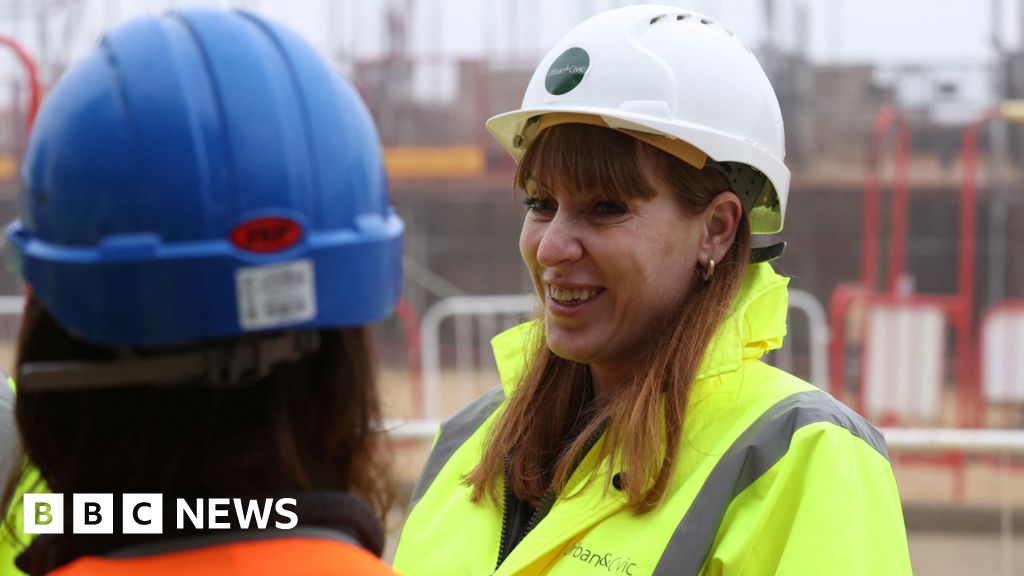Dafunkdoc_Unlimited
Theological Noncognitivist Since Birth
- Joined
- Jul 25, 2012
- Messages
- 45,062
- Reputation
- 8,164
- Daps
- 122,311
- Reppin
- The Wrong Side of the Tracks

UK 'doesn't have enough builders' for Labour's 1.5m homes
Builders and developers say reforms are needed to recruit more tradespeople to build the homes being promised.
Tens of thousands of new recruits are needed for bricklaying, groundworks and carpentry to get anywhere near the target, they told the BBC.
The Home Builders Federation (HBF), along with the UK's largest housebuilder Barratt Redrow said skills shortages, ageing workers and Brexit were some of the factors behind the shrinking workforce.
The government confirmed there was a "dire shortage" of construction workers but said it was "taking steps to rectify" the problem.
Last week, Prime Minister Sir Keir Starmer repeated the pledge he made soon after taking power to deliver 1.5 million new homes in England by 2029.
And on Thursday he unveiled sweeping changes to the planning system and vowed to override "blockers" standing in the way of building the new homes.
Labour hopes building more homes will reduce house prices and make buying and renting homes more affordable, especially for younger people.
Its target means building an average of 300,000 new homes a year - in recent years the number has been about 220,000.
The current workforce is estimated to be 2.67 million, according to the Construction Industry Training Board (CITB).
But for every 10,000 new homes to be built, the sector needs about 30,000 new recruits across 12 trades, according to the HBF, the trade body for the house building industry in England and Wales.
Based on the government's plans, the estimated number of new workers required for some common trades, for example, would be:
- 20,000 bricklayers
- 2,400 plumbers
- 8,000 carpenters
- 3,200 plasterers
- 20,000 groundworkers
- 1,200 tilers
- 2,400 electricians
- 2,400 roofers
- 480 engineers
When asked if there were enough workers currently to build the extra homes, David Thomas, chief executive of Barratt Redrow, said: "The short answer is no."
He told the BBC the government would have to "revolutionise the market, revolutionise planning, revolutionise methods of production" for their target to be met.
"They're challenging targets, I think we have to recognise that this is a national crisis," Mr Thomas said.
But the HBF also said the UK "does not have a sufficient talent pipeline" of builders to employ. It cited several recruitment constraints, including a poor perception and lack of training within schools, not enough apprenticeships and the costs of taking on apprentices.
The industry body admitted the sector itself had not "attracted" enough new recruits in recent years.
All of these factors over time has resulted in an ageing workforce, with a quarter of workers being aged over 50, it said.
Barratt Redrow boss Mr Thomas said recruitment had not been helped by a drive in past decades to encourage young people into further education rather than trades.
"If you went back to the 60s and 70s, I think parents, teachers, and the government were very happy with the idea that people became trades - electricians, plumbers, bricklayers," he said.
The average rates of pay for these jobs "are high" but the issue was "more about availability of labour with skills, he said.
An experienced bricklayer can earn around £45,000 per year, while carpenters are paid about £38,000 and electricians £44,000, according to government figures.
Skills shortages have been an issue in the UK for some time, but the gap had been partially plugged in recent decades with workers from the European Union - a recruitment pool which has dried up after freedom of movement ended as a result of Brexit.
The HBF said 40 to 50% of skilled workers had also left the industry following the 2008 financial crash and "restrictions" had made it harder to recruit from overseas.
Mr Thomas said historically the building sector had recruited a significant number of bricklayers from eastern EU countries, admitting that "in hindsight", the UK had been over-reliant on overseas workers but it had been the "norm".
According to the industry's latest census, Romania, India and Poland were the most common countries of origin for construction workers from overseas. More than half of London's construction workforce are EU/EEA nationals.
Last month, the government announced £140m of funding to create 5,000 more construction apprenticeship places per year and established "homebuilding skills hubs" to fast-track training.
A government spokesperson said the skills hubs showed it wanted to "make sure this country takes skilled careers like construction seriously".
But ministers received a blow to its plans from local councils, charged with implementing the new targets in their areas, who said they were "unrealistic" and "impossible to achieve".
The independent think tank Centre for Cities also estimated the housebuilders will fall 388,000 short of the government's 1.5m target.
But both Barratt Redrow and the HBF have welcomed the government plans. The HBF said "a more pro-development policy approach" would enable the industry to "invest in the people and land needed to increase housing supply".
Despite recruitment challenges, Barratt Redrow is planning to build between 16,600 and 17,200 in the next financial year, almost 4,000 more than what Barratt itself forecast, before the merger with Redrow in October.




